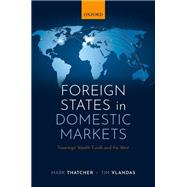Foreign States in Domestic Markets Sovereign Wealth Funds and the West
, by Thatcher, Mark; Vlandas, Tim- ISBN: 9780198786085 | 0198786085
- Cover: Hardcover
- Copyright: 3/16/2022
Political economy debates have focused on the internationalisation of private capital, but foreign states increasingly enter domestic markets as financial investors. How do policy makers in recipient countries react? Do they treat purchases as a threat and impose restrictions or see them as beneficial and welcome them? What are the wider implications for debates about state capacities to govern domestic economies in the face of internationalisation of financial markets?
In response, Foreign States in Domestic Markets have developed the concept of 'internationalised statism', where governments welcome the use of foreign state investments to govern their domestic economies. These foreign state investments are applied to the most prominent overseas state investors, Sovereign Wealth Funds (SWFs). Many SWFs are from Asia and the Middle East and their number and size have greatly expanded, reaching $9 trillion by 2020. This book examines policies towards non-Western SWFs buying company shares in four countries: the US, UK, France, and Germany. Although the US has imposed significant legal restrictions, the others have pursued internationalised statism in ways that are surprising given both popular and political economy classifications. This book argues that the policy patterns found are related to domestic politics, notably the preferences and capacities of the political executive and legislature, rather than solely economic needs or national security risks. The phenomenon of internationalised statism underlines that overseas state investment provides policy makers in recipient states with new allies and resources. The study of SWFs shows that internationalisation and liberalisation of financial markets offer national policy makers opportunities to govern their domestic economies.
In response, Foreign States in Domestic Markets have developed the concept of 'internationalised statism', where governments welcome the use of foreign state investments to govern their domestic economies. These foreign state investments are applied to the most prominent overseas state investors, Sovereign Wealth Funds (SWFs). Many SWFs are from Asia and the Middle East and their number and size have greatly expanded, reaching $9 trillion by 2020. This book examines policies towards non-Western SWFs buying company shares in four countries: the US, UK, France, and Germany. Although the US has imposed significant legal restrictions, the others have pursued internationalised statism in ways that are surprising given both popular and political economy classifications. This book argues that the policy patterns found are related to domestic politics, notably the preferences and capacities of the political executive and legislature, rather than solely economic needs or national security risks. The phenomenon of internationalised statism underlines that overseas state investment provides policy makers in recipient states with new allies and resources. The study of SWFs shows that internationalisation and liberalisation of financial markets offer national policy makers opportunities to govern their domestic economies.






